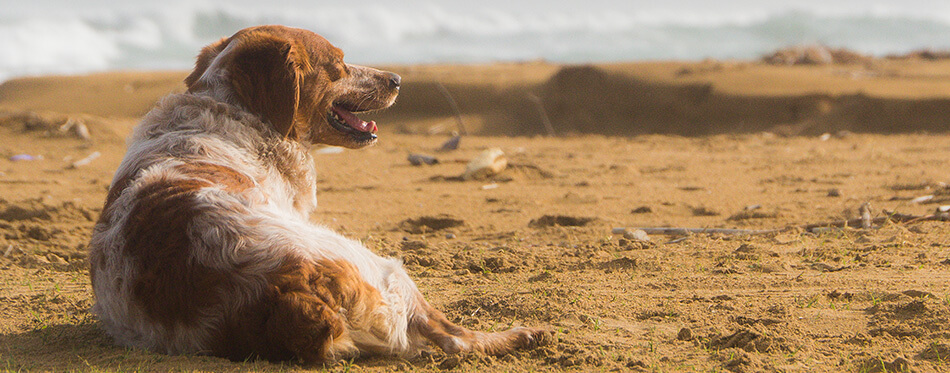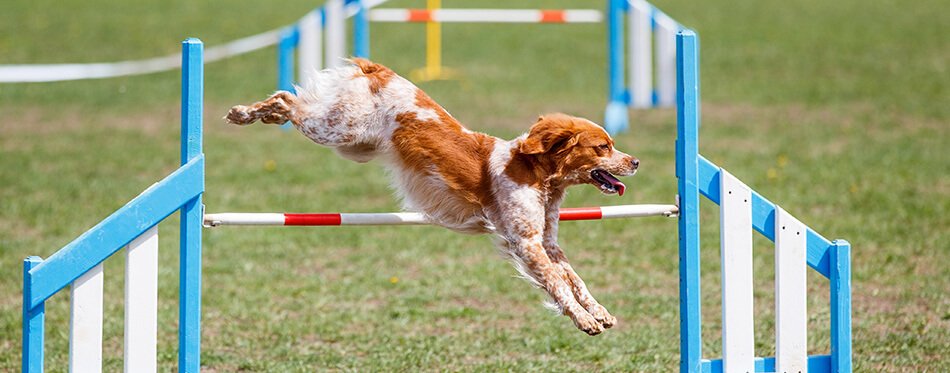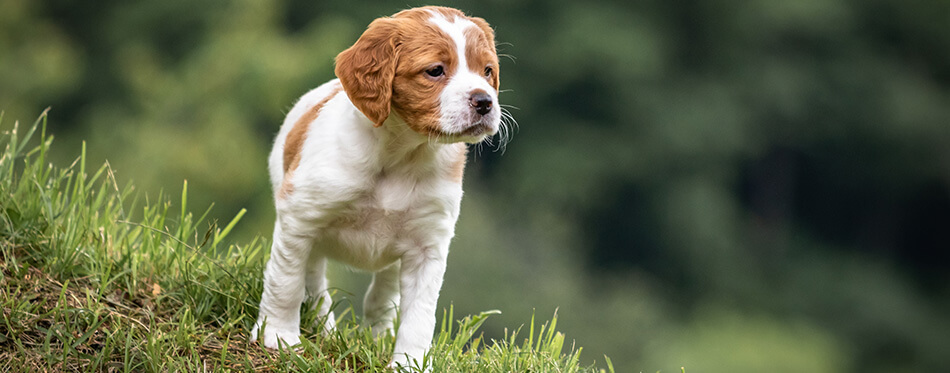Originally bred as gundogs, the Brittany is an energetic, loveable canine that thrives in an active home. And his medium-size coupled with his zest for life and loyal, eager to please nature is fast making this handsome pooch a popular family breed.
But with all that energy, the Brittany dog needs plenty of time and attention from his human pack. But, as many Brittany dog owners can testify, the effort is more than worth it. So, is the high-octane Brittany the right dog for you? We take a closer look at these versatile hunting dogs so you can decide.
Breed Overview
- Dog Breed Group Sporting Group
- Height Males: 19 inches; Females: 18 inches
- Weight 30 – 40 pounds
- Life Expectancy Life span of between 12-14 years

Short History of the Brittany Dog
As the name suggests, the Brittany originates from northwest France, more specifically the Brittany region that used to be an independent kingdom and which traded regularly with the Welsh, just across the English Channel. And this connection means that the Brittany has many similarities to the Welsh Springer Spaniel.
The first known recording of a Brittany-type dog dates to the 17th century when many paintings included a medium liver and white dog with a distinctive docked tail alongside game birds. The Brittany dog as we know it today – thought to be a cross between a spaniel and an English setter – started to gain prevalence in the mid-1800s, where it became revered for its joint abilities to point (like a setter) and retrieve. These skills, along with its speed, agility, and trainability, made the Brittany much sought after as a versatile gundog, hunter, and retriever of game, most notably partridge, duck, and pheasant. However, these traits also made the breed a popular choice for poachers to retrieve illicit games.
The first Brittany dog to be formally registered in France was a white and orange male called Boy, in 1907. The breed – then known as the ‘Epagneul Breton’ or Brittany Spaniel – finally made its journey Stateside in 1931 and was recognized by the American Kennel Club (AKC) in 1934, before the national breed club, the American Brittany Club was established in 1942.
The breed went through a period of decline after World War II, leading to French breeders allowing black-spotted dogs into the breed standard to boost the gene pool. However, the US didn’t follow suit and black is still not an accepted color for the Brittany in the US. Combinations of liver, orange, white, and roan remain the only accepted Brittany colors in the AKC standard.
Originally registered as a spaniel, in 1982 the AKC decided to remove the word and rename the breed the Brittany, as many breeders argued that Brittanys are pointers, not flushing dogs like a spaniel. This name change also marked divergence between the French Brittany and the American breeding lines to show they are not the same breed.
Today, the Brittany ranks as the 28th most popular breed in the US, according to the AKC.
Breed Facts
Before we dig deeper into this handsome, dynamic, and loving breed, here are some key breed facts about the Brittany to set the scene:
- As medium shedders with water and dirt-repellent fur, the Brittany is low maintenance when it comes to their grooming routine. However, they cannot be considered hypoallergenic dogs as they do shed regularly.
- One of the US’s pointing breeds, the Brittany works naturally as a hunting dog, and will both point and retrieve. For hunting newcomers, the Brittany is considered one of the best dogs to have.
- As high-energy dogs, the Brittany needs at least an hour of full-on exercise a day, as well as plenty of mental stimulation, otherwise, they can become highly strung and destructive.
- They make wonderful pets for an active family, although they can be a little boisterous so need supervision around very small children.
- Some Brittany pups are born without a tail, due to a dominant gene that may be present in one of their parents.
- The Brittany will love you to the moon and back, but they are also known for their, at times, over-sensitive nature. This means the breed doesn’t respond well to harsh treatment or raised voices and can quickly develop separation anxiety if left alone for too long.
How Big Does a Brittany Dog Grow?
A medium-sized animal with a big, energetic pooch mentality, for many the Brittany is one of the ideal-sized sporting dog breeds. Standing at between 17 and 20 inches to the shoulder and weighing around 30-40 pounds, their appearance is all legs with a lithe yet sturdy body and well-balanced head. Their tail is also a feature and can be either naturally bobbed or purposely docked. Some Brittany puppies can be born tail-less. Another stand-out to the Brittany is that their skin is fairly loose, creating rolls of skin around the body, which it thought to protect the dog from thorn puncture wounds when out in the field.
The coat of this dog breed is dense, with fur that is either flat or wavy (but never curly). You will see some feathering on their floppy ears and legs. A real plus about their coat is that it naturally repels water and dirt.
The main coat colors for the breed are liver and white or orange and white, often with a roan pattern. Occasionally you will find a tri-colored dog.
Temperament
With a fun, energetic personality enhanced by its loveable, loyal, and intelligent temperament, it’s no wonder the Brittany breed is growing in popularity. Easy to train and care for, they are, however, energetic dynamos that need a family that can match their enthusiastic take on life.
Are Brittany Dogs good family dogs?
OK, they can be on the hyperactive side and at times a little too sensitive, but the Brittany dog breed is super-loving and can make a fantastic pet for an active family. With plenty of energy, bags of personality, and an in-built desire to please, the Brittany has a lot to give the right family and will lap up the love and attention he gets in return.
The Brittany’s super-friendly nature means he gets on with children as well as other dogs and other pets. However, you just need to be aware that this breed does have a high prey drive and so will need to be kept away from smaller pets, including birds such as chickens. And his exuberant nature means that while he loves to be with kids, he will need supervising when around young children. But these happy-go-lucky, friendly dogs love nothing more than to be playing with their humans and can be the perfect fit for the active family who loves the outdoors.
Do Brittany Dogs Bark a Lot?
Compared to other breeds, the Brittany is considered a moderate barker. However, their volume can be turned on – and up – if they are left to their own devices for too long. Intelligent and with an active body and mind, Brittany dogs need stimulation to stave off boredom or anxiety and can otherwise become restless. This in turn can lead to undesirable behaviors, such as excessive barking. He is literally demanding that you take notice and give him the attention he deserves.
To prevent your Brittany from becoming a problem barker, consistent training and early socialization are a must. You also need to ensure he has sufficient vigorous exercise to burn off his excess energy, as well as company and mental stimulation to keep him from getting bored.
How Do you Keep Brittany Dogs Entertained?
Your Brittany is a natural athlete and renowned for his hunting skills; he is also known as an excellent pointing breed. For such a high energy dog, that means he needs sufficient exercise and mental stimulation
Their agility, speed, and hunting skills mean the Brittany is also the perfect canine for dog sports, including agility, flyball, obedience, and tracking, and as they are easy to handle, are good hunting dogs for newbies to the sport.
Back home, and food puzzles and interactive dog toys will work off any excess physical or mental energy, before you settle down for a relaxing night on the sofa, as the Brittany also loves to be at the heart of his family
Do Brittany Dogs Like Water?
One of the most versatile sporting breeds with a flair for catching birds, including waterfowl such as ducks, the Brittany is an excellent swimmer. Plus, their dense coat helps to insulate them from the cold, so they enjoy being in the water. But as with any dog, always supervise them when near or in water to ensure they are safe at all times.
Do They Like to Cuddle?
While not your typical ‘lapdog’ – he’s a dog breed that’s far too busy for that – the Brittany is incredibly loving and laps up attention from his human as much as he loves giving it. So, while he will expect you to keep up with him, the Brittany also takes comfort from settling down with his family at the end of the day.
Are Brittany dogs Easy to Potty Train?
With that sharp brain and eager-to-please attitude, Brittany spaniel puppies should be easy to train to go potty, but you will still need to take it progressively. And as they are a sensitive breed, add in plenty of reassurance and treats.
One thing to note about this breed is that they are prone to submissive urination. This happens when a dog gets overexcited or feels intimidated, which all fits with the Brittany personality and results in uncontrolled urination, or dribbles. It mainly affects younger dogs and, again, with patience and calm/kind handling, it can be overcome but you mustn’t punish as Brittanys don’t respond well to aggression.
Care
With his working dog instincts and deep loyalty for his human, coupled with boundless energy and a razor-sharp brain, there is so much to love about the Brittany dog breed. But he does like to roam and needs plenty of daily exercises, so you need to get your care routine for this breed just right. He is probably not best suited to an apartment lifestyle unless he has access to a large, enclosed yard and so a family home with plenty of outdoor space is the ideal.
Here are some other key aspects to consider when looking to bring a Brittany dog into your home.
Are Brittany Dogs easy to train?
A breed that loves to learn, the Brittany is easy to train and can go on to excel in dog sports. And as they are so energetic with a strong prey drive, consistent obedience training is a must so that you can recall and control them in open spaces. Early socialization is also essential, as while Brittany spaniels are super-friendly, they need to understand appropriate behavior when around other dogs.
The only fly in the training ointment is that the Brittany is a sensitive soul and will react badly if their training or treatment is too harsh. And this can lead to sulking and anxiety as well as undesirable behaviors such as stress incontinence.
So, when it comes to training, positive reinforcement, calm mannerisms and plenty of rewards is the way to a Brittany dog’s obedient heart.
How much exercise does a Britany Dog need?
At least an hour of physical exercise a day is advised but to keep your Brittany entertained it’s important to mix it up with outdoor activities that also provide mental stimulation. Whether that’s being your jogging companion, playing frisbee or accompanying you on outdoor adventures, as an active owner, there’s plenty you can do to satisfy this gorgeous dog’s curiosity.
What food do Brittany Dogs eat?
As an active canine, the Brittany dog breed requires high-quality protein to sustain their energy and activity levels as well as all-around good health. This is why a quality, nutritionally balanced dog food that is rich in protein and good fats is the ideal choice for your Brittany’s food bowl. And if your Brittany is a sporting or working dog, then opt for a formula designed for pro dogs so you can be sure he is getting the calories and nutrients he needs to maintain an appropriate weight.
How much should you feed a Brittany Dog?
Always follow the feeding instructions on the product you have chosen for your Brittany. However, as a guide, an active adult dog should have 1.5 to two cups of quality kibble per day, split into two meals plus, if required, treats which should make up no more than 10% of his daily food intake.
If you are unsure as to what you should be feeding your Brittany or have a young Brittany pup, then do seek advice from a veterinarian.
Do Brittany Dogs shed a lot?
While not excessive or super-intense shedders, the Brittany dog breed does have a soft, dense coat that will shed, especially during seasonal changes. But with a regular grooming routine, his excess dog hair is manageable and shouldn’t leave your home too “cloud-like”!
How do you Groom a Brittany Spaniel Dog?
As he was bred to be an all-weather hunting dog, the Brittany’s coat is robust, dense, and easy to maintain. However, depending on how active your pooch is (and with most Brittanys, the activity level will be high), his coat will pick up dirt and debris.
To keep this breed’s coat in tip-top condition, weekly brushing is recommended to remove any loose hair and dirt as well as keep the longer sections tangle-free. A soft pin brush is the best grooming tool, as his looser skin can be sensitive and needs gentle care when brushing. And a bath only when he needs it is ideal, usually every three months.
Top up your doggo’s grooming routine with a two to three times a week teeth clean, a weekly check of his ears, gently cleaning if necessary and a nail trim around once a month.

Are they Healthy?
Robust and naturally active, the modern Brittany dog breed is generally healthy with a good life span although the breed can be susceptible to some specific genetic health problems and general health concerns. Health issues to be aware of with the Brittany include:
Epilepsy
This condition, which causes mild through to severe seizures, can be hereditary which is why it is important for your puppy’s parents to have been screened. However, it can also have other causes, including infection and metabolic disorders as well as tumors so a vet check is essential. While epilepsy cannot be cured, with medication and the right management plan it can be controlled.
Hip Dysplasia
This condition, which causes the hip joint to be deformed and so doesn’t fit correctly into the socket, can also be genetic. Hip dysplasia can lead to mobility issues as well as arthritis and in more serious cases, surgery may be needed.
Hypothyroidism
Caused by low levels of the hormone, thyroid, hypothyroidism can lead to obesity, cognitive dysfunction, low energy, irregular body temperature, and coarse fur as well as tougher skin. With medication, the condition can be successfully treated.
Eye conditions
The Brittany can also be prone to eye issues, including glaucoma, progressive retinal atrophy, and primary lens luxation. Left untreated, these conditions can cause sight loss so any concerns about your Brittany’s eyesight should be checked out by your vet.
Discoid lupus erythematosus
This autoimmune disease can affect the skin of a Brittany and is usually first seen on their nose, which may change color or texture.
How long do Brittany Dogs live?
As a medium-sized, active dog with relatively few breed-specific health issues, Brittany dogs have a good life span and can live to around 15 years.
How to Find a Good Breeder
If you decide you want to buy a Brittany puppy, then it is essential that you do your research and only ever buy from a responsible breeder and never from a puppy mill or pet store.
With a reputable breeder, you will get the extra reassurance of their breeding methods as well as the health and condition of the parents to ensure that your new pup is healthy. When viewing your new pup, always ask to see medical records and evidence of screening and tests to ensure the puppy’s parents are free of any genetic diseases which can be passed on to their Brittany puppies. Also, ask to meet the canine parents so you can see first-hand their temperament and condition.
To find a reputable Brittany dog breeder, check the American Kennel Club website, or the American Brittany Club.

Adopt a Brittany Dog From a Rescue Center or Shelter!
If you are prepared to give a rescue or shelter dog a home, especially an adult or more senior pooch, then this route can be one of the most rewarding ways to become a pet parent. And, as sometimes the breed is bought without fully understanding its needs, it is possible to find a Brittany rescue dog that needs a new home.
Your first port of call, if you are interested in adopting a Brittany, is to check with your local rescue center or contact organizations such as the National Brittany Rescue and Adoption Network or the American Brittany Rescue, who can point you in the right direction.
What is the average price for a Brittany Dog?
When buying from a reputable breeder, you can expect to pay between $700 and $1,250 for a Brittany puppy, although a pup from a top-quality breeding line can top $2,000 or more. But as with any puppy, the initial purchase price is just the initial expense of bringing a new dog into your home. When deciding to buy a Brittany pup, you also need to factor in the cost of caring for your new dog, including food, equipment, training, and medical cost during his lifetime.
Source:
- The Brittany dog American Kennel Club

